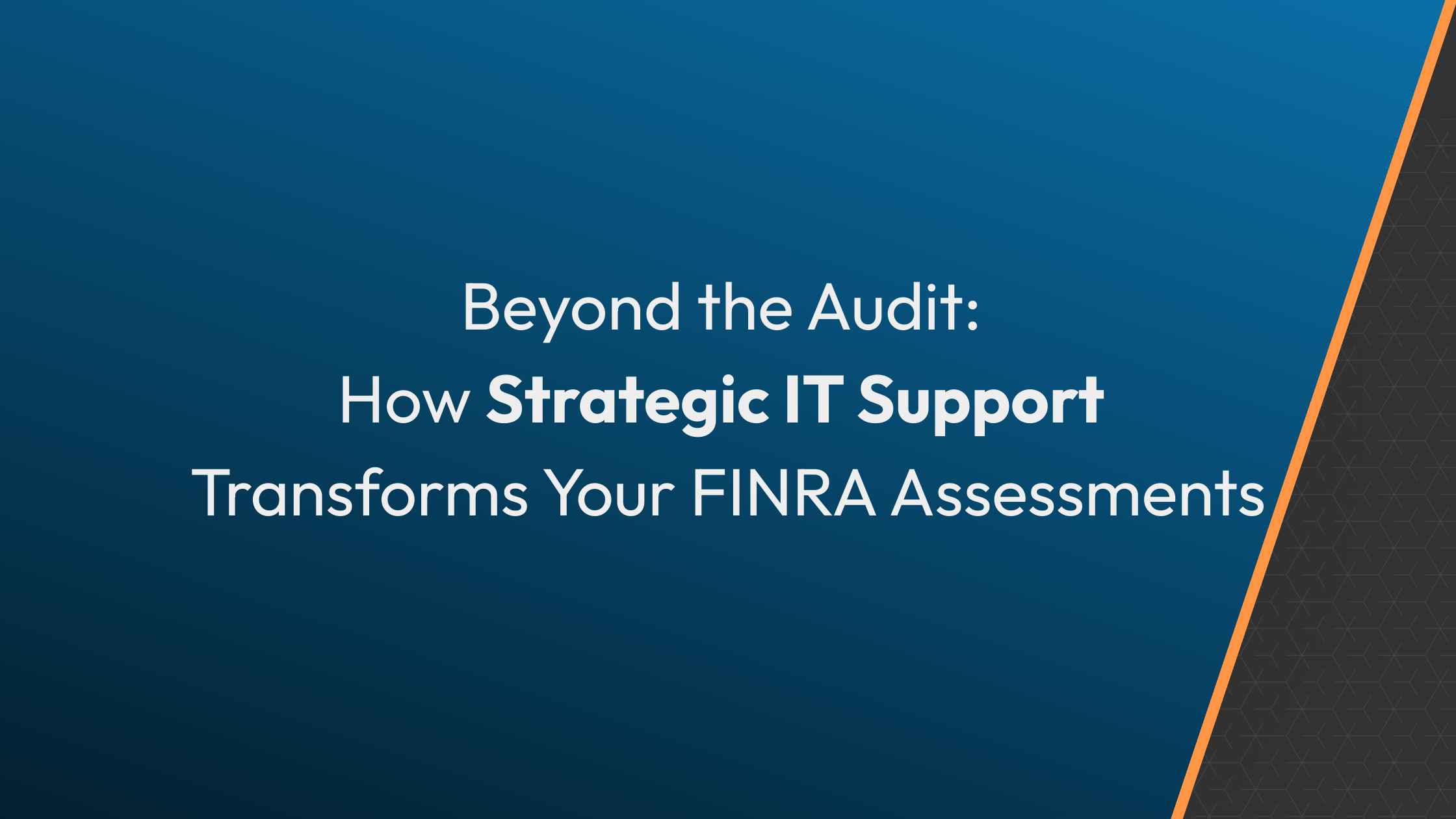
Introduction
Those who work in the financial industry know just how vital FINRA is. After all, the Financial Industry Regulatory Authority (FINRA) serves as a crucial regulatory body that oversees the securities industry within the United States. Its primary role is to safeguard investors, maintain market integrity, and promote fair and transparent practices across financial firms. When FINRA conducts an audit, it’s not just a procedural check, it’s a comprehensive examination of a broker-dealer’s operations, books, and records to ensure compliance with federal regulations. To do this, auditors assess multiple areas, including customer protection, financial responsibility, trading, and sales practices.
But FINRA audits are more than regulatory hurdles. They’re opportunities to identify vulnerabilities, enhance operational efficiency, and strengthen overall business resilience. For financial firms, these assessments can serve as pivotal moments to uncover gaps in compliance and IT infrastructure. Rather than viewing audits as a one-time obligation, strategic firms use them as catalysts for improvement and long-term security.
In this blog, we’ll explore the common pitfalls financial firms face during FINRA assessments, the gap between basic IT support and strategic compliance, and how Charles IT bridges that gap by aligning technology solutions with regulatory requirements. We’ll also discuss what a proactive audit strategy looks like and why having a long-term IT partner can be a game changer during assessments and beyond.
Common Pitfalls Financial Firms Face
When it comes to FINRA assessments, or regulatory compliance in general, financial firms often encounter recurring challenges that can jeopardize their standing and expose them to significant risk. These pitfalls aren’t always just minor oversights but can be critical vulnerabilities that can lead to compliance violations, reputational damage, and financial loss. The most prevalent issues include:
- Cyberattacks: The financial industry is a prime target for cybercriminals due to the vast amounts of sensitive data it manages. A single data breach can not only disrupt operations but also raise red flags during a FINRA audit. That means that maintaining robust cybersecurity measures isn’t just a best practice; it’s a regulatory necessity.
- Data Privacy: Protecting client data isn’t just about encryption, it’s about ensuring data is properly managed, stored, and accessed in accordance with FINRA regulations. Firms that fail to implement comprehensive data privacy protocols can quickly find themselves facing penalties and heightened scrutiny.
- Incomplete or Disorganized Records: Accurate and accessible recordkeeping is essential during FINRA audits. Missing or improperly maintained documentation can signal poor compliance management and raise concerns about a firm’s internal controls.
- Reactive IT Support: Many financial firms adopt a reactive approach to IT, addressing issues only when they arise. However, during a FINRA audit, this can backfire. Without proactive IT support, firms are more likely to miss compliance gaps that could have been mitigated through regular assessments.
Yet identifying these pitfalls is just the first step…
The Gap Between Technical IT Support and Strategic Compliance
While IT support and strategic compliance are interconnected, they serve different purposes. For one, technical IT support is typically reactive and issue-focused, addressing immediate concerns as they arise. Strategic compliance, on the other hand, is proactive and regulation-focused, anticipating risks and aligning IT infrastructure with regulatory frameworks.
Unfortunately, many financial firms mistakenly assume that basic IT support covers compliance requirements, which is a misconception that often leads to significant gaps, including:
- Reactive vs. Proactive: Technical support addresses immediate IT issues, but strategic compliance takes a forward-looking approach, identifying risks and aligning IT systems with FINRA regulations before problems arise.
- Compliance Blind Spots: IT teams focused solely on troubleshooting may lack the regulatory expertise needed to spot compliance gaps, leaving critical vulnerabilities unaddressed.
- Data Management and Documentation: While standard IT support may maintain systems, it doesn’t necessarily ensure the integrity and accessibility of records required for audits. Effective data management involves documentation and secure storage practices, crucial for regulatory compliance.
Overlooking strategic compliance can have serious consequences, including increased audit findings and penalties, reputational damage, and even just missed opportunities for improvements.
Fortunately, that’s where an MSP like Charles IT can come into bridge that gap to transform your FINRA assessments.

How Charles IT Bridges Compliance and Business Growth
A reliable managed service provider (MSP) like Charles IT can bridge the gap between FINRA compliance and business growth. At Charles IT, our approach is centered around aligning IT support with regulatory compliance to not only meet FINRA requirements but also drive overall business success.
We start with a proactive compliance strategy, conducting regular assessments to pinpoint potential gaps and address them before they become costly issues. From there, we develop customized IT roadmaps tailored to FINRA guidelines, ensuring every aspect of your IT infrastructure is audit-ready.
Next, we implement advanced cybersecurity measures designed to safeguard sensitive financial data. Our security frameworks include continuous monitoring and threat detection to prevent breaches that could compromise compliance.
Data management and documentation are also key during audits. Charles IT streamlines data management processes to maintain accurate, accessible records that meet FINRA standards. We also deploy automated documentation systems to ensure data integrity and support regulatory reporting requirements.
But our support doesn’t end once the audit is over. We provide ongoing strategic guidance to maintain compliance readiness. This includes regular check-ins, system updates, and strategic planning to keep your business aligned with evolving FINRA regulations and emerging threats.
What A Proactive Audit Strategy Looks Like
A successful FINRA audit strategy goes beyond reacting to immediate compliance concerns since it’s about establishing an ongoing approach that keeps your firm prepared year-round. Here’s a checklist on how Charles IT helps financial firms build a proactive audit strategy:
- Regular Assessments: Conduct routine compliance reviews to identify potential gaps and address vulnerabilities before they become issues.
- Customized IT Roadmaps: Develop strategic IT plans that align with FINRA guidelines, ensuring every aspect of your infrastructure is audit-ready.
- Advanced Cybersecurity: Implement continuous monitoring and threat detection to prevent breaches that could jeopardize compliance.
- Streamlined Data Management: Maintain accurate, easily accessible records through automated documentation systems that simplify regulatory reporting.
- Ongoing Support: Schedule regular check-ins to adjust strategies based on evolving regulations and emerging risks.
By adopting a proactive audit strategy, financial firms can meet FINRA requirements and transform compliance into a catalyst for business growth.

The Benefit of Having a Long-Term IT Partner During Assessments
When it comes to FINRA assessments, consistency and continuity in IT support are invaluable. A long-term IT partnership provides stability, proactive planning, and a deeper understanding of your firm’s unique compliance needs. Other key benefits include:
- Proactive Compliance Management: A dedicated IT partner can anticipate regulatory changes and adjust strategies to keep your firm audit-ready.
- Streamlined Data Management and Reporting: Consistent support ensures that records are properly maintained and easily accessible, simplifying the audit process.
- Continuous Cybersecurity Monitoring: Ongoing threat monitoring helps prevent breaches that could disrupt compliance efforts.
- Strategic IT Planning for Future Assessments: With a long-term roadmap in place, your IT partner can align your infrastructure with evolving FINRA requirements.
- Peace of Mind and Reduced Disruption: Established protocols and ongoing support minimize disruptions during assessments, allowing your team to stay focused on core business operations.
Conclusion
Navigating FINRA assessments doesn’t have to be a stressful, last-minute scramble. With the right IT partner, you can transform regulatory compliance into a strategic advantage that drives business growth. At Charles IT, we specialize in bridging the gap between technical support and strategic compliance, providing financial firms with proactive IT strategies that keep them audit-ready year-round.
Ready to align your IT infrastructure with FINRA requirements? Book a meeting with Charles IT today to discover how our customized solutions can streamline your next assessment and strengthen your overall compliance strategy.




